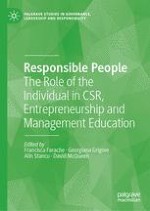2019 | Buch | 1. Auflage
Responsible People
The Role of the Individual in CSR, Entrepreneurship and Management Education
herausgegeben von: Francisca Farache, Georgiana Grigore, Alin Stancu, David McQueen
Verlag: Springer International Publishing
Buchreihe : Palgrave Studies in Governance, Leadership and Responsibility
